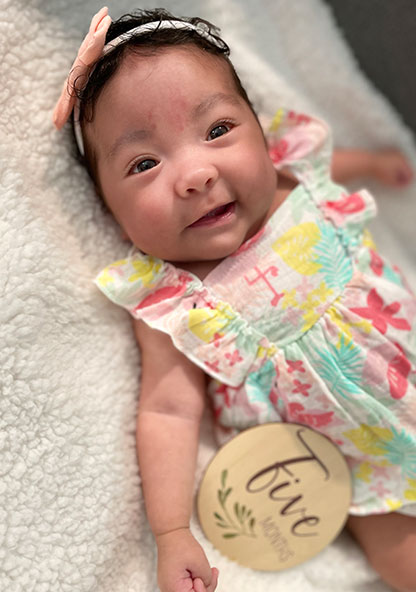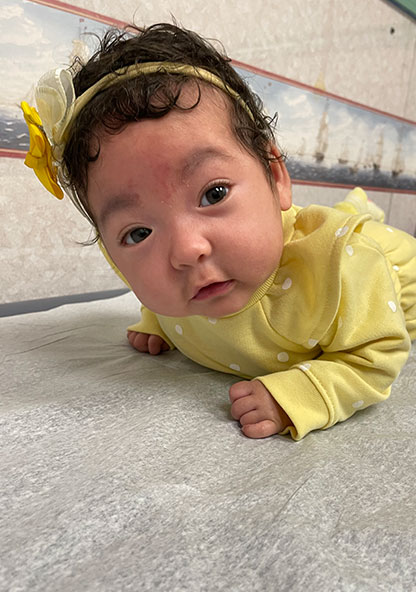Aiyana’s Birth Brings Hope and Joy After Challenging Journey to Parenthood
 Katerin and her husband, Edward, are proud, loving parents to their two beautiful children, who they consider nothing short of miraculous blessings: a 7-year-old daughter named Amy, and a 5-month-old daughter, Aiyana. However, the path to their second daughter’s birth was not without its challenges.
Katerin and her husband, Edward, are proud, loving parents to their two beautiful children, who they consider nothing short of miraculous blessings: a 7-year-old daughter named Amy, and a 5-month-old daughter, Aiyana. However, the path to their second daughter’s birth was not without its challenges.
Three years before becoming pregnant with Aiyana, the couple went through the heartbreak of a miscarriage at 16 weeks.
“Enduring the loss of our baby was difficult,” said Katerin. “But when we found out we were expecting again, we were both excited and nervous. I wanted to come up with a creative way to share the exciting news with my husband, so I found the perfect onesie that read, ‘I tested positive but not for COVID.’ As soon as he saw it, his face lit up. We were so happy as we embraced this new chance for parenthood.”
A Challenging Pregnancy
During her pregnancy journey, Katerin was under the expert care of Dr. Kimberly Crittenden, an OB-GYN who practices at CHRISTUS Santa Rosa Hospital – Westover Hills. Katerin had hoped for a smooth pregnancy, but in her second trimester, she faced a series of pregnancy complications including cervical incompetence. At 20 weeks, Katerin underwent an emergency medical procedure known as a cerclage. This procedure was essential to stabilize her weak cervix and safeguard the continuation of her pregnancy, ensuring the baby remained safely inside.
Cervical Incompetence and Treatment
What is cervical incompetence? Cervical incompetence is a medical condition where the cervix (the lower part of the uterus) weakens and becomes unable to support a pregnancy to full term. This can result in premature cervical dilation and early delivery, which can lead to miscarriage or preterm birth.
What is cervical incompetence? Cervical incompetence is a medical condition where the cervix (the lower part of the uterus) weakens and becomes unable to support a pregnancy to full term. This can result in premature cervical dilation and early delivery, which can lead to miscarriage or preterm birth.
Symptoms to watch out for:
- Pain or pressure in the pelvic area
- Vaginal discharge or bleeding during the second trimester of pregnancy
- Sensation of “something coming out” in the vagina.
Treatment options: Timely and appropriate intervention is essential to manage cervical incompetence and improve pregnancy outcomes. Several treatment options are available, including:
- Cervical cerclage: This procedure involves temporarily sewing the cervix closed with stitches to help the cervix hold a pregnancy in the uterus. It’s usually performed in the second trimester.
- Progesterone supplementation: Progesterone hormone therapy may be prescribed to help maintain the pregnancy and reduce the risk of complications including pre-term labor.
- Bedrest and activity restrictions: In some cases, doctors may recommend reduced physical activity and bed rest to minimize pressure on the cervix and prevent premature delivery.
Consultation with a health care provider: If you experience any symptoms or have concerns about cervical incompetence during your pregnancy, it’s essential to seek immediate medical attention. A health care provider at CHRISTUS Children’s can evaluate your condition, recommend appropriate treatments, and provide personalized care to optimize your chances of a successful pregnancy and a healthy delivery.
Following her cerclage procedure at 20 weeks, Katerin recovered in the hospital for five days before her discharge, and she was placed on three weeks of strict bed rest. Despite these precautions, her pregnancy took an alarming turn when her water broke unexpectedly. She was only 24 weeks into her pregnancy.
“My water broke a week after my surgery,” said Katerin. “I was working from home when I suddenly felt a wet sensation. I was alone and I started panicking. I called my husband and he picked me up and took me to CHRISTUS Santa Rosa Hospital-Medical Center. When we got confirmation that my water had broken, I tried to stay hopeful. However, it brought back painful memories of when we lost our baby three years ago.”
In need of a higher level of maternal fetal care, Katerin was transported to CHRISTUS Children’s.
Once at CHRISTUS Children’s, Katerin’s maternal fetal medicine team monitored her condition and took measures to support the baby’s development and maximize the chances of a positive outcome. “I was put on bed rest and was also prescribed medications including antibiotics to prevent infection since my water broke,” said Katerin. “They gave me steroids to accelerate my baby’s lung development, and as part of the plan to support my high-risk pregnancy, I took magnesium sulfate which is used in mothers anticipating a premature birth to protect the premature newborns’ brain. But the plan was to keep my baby inside of me for as long as possible.”
Katerin stayed at CHRISTUS Children’s for three weeks until Aiyana’s arrival.
Aiyana’s Early Debut
Just one week before Aiyana’s birth, Katerin began experiencing contractions, accompanied by bleeding, necessitating an emergency Cesarean section. On March 5, 2023, Katerin and her husband welcomed their daughter into the world. She weighed 1.5 pounds and arrived early at just 24 weeks gestation.
“I remember hearing her cry, but it was very faint,” said Katerin. “I did not get a chance to hold her because she was immediately sent to the Neonatal Intensive Care Unit (NICU). Thankfully, Aiyana was breathing on her own with the help of a CPAP machine. She didn’t need to be intubated which was a relief for a baby born that prematurely. At 24 weeks her lungs weren’t strong but improved gradually.”
Aiyana spent a total of 102 days in the NICU where she underwent different treatments and tests to ensure her growth and development. Alongside the CPAP machine, she was connected to EKG electrodes to monitor her heart, a PICC line for medication and fluid administration, and a feeding tube through her nose for nutrition.
“Aiyana didn’t have any major complications during her time in the NICU,” said Katerin." The primary focus was on reaching her crucial breathing and feeding milestones. Her nurses and doctors in the NICU
were amazing, always explaining every step in my daughter’s care with love and compassion. Everyone treated my baby as if she was part of their own family. We visited Aiyana every day in the NICU where I was able to kangaroo care (skin-to-skin) with her. Leaving her there was tough, but our neonatologist, Dr. Katherine Brandt, made me feel like my baby was going to be OK and that I was at the right place for her care.”
Over time, Aiyana’s strength grew, and her parents celebrated each milestone with her in the NICU. She graduated from the feeding tube to breastfeeding and bottle feeds. Finally, just in time for Father’s Day, Aiyana was able to leave the NICU, weighing a healthy 6 pounds.
Aiyana Today
Today, 5-month-old Aiyana is doing great and her big sister, Amy, and her other siblings, Edward Jr., Athena and Elina, adore her. Aiyana weighs 8 pounds now and her little personality is shining through. Her parents call her their little miracle baby who brings them immense happiness after everything they’ve been through. Katerin says Aiyana serves as a reminder that hope and faith endure through tough times. Their faith and support kept them strong during this time. 
“I prayed a lot for God to give me strength and save our baby,” said Katerin. “I never lost my faith or my hope. I prayed for all the doctors and nurses who took great care of Aiyana. We are grateful for the care that I received during and after my pregnancy, and the care our baby received at CHRISTUS Children’s.”
To learn more about the neonatal intensive care unit (NICU) at CHRISTUS Children’s, please visit NICU | Highly-Specialized Neonatal Care | CHRISTUS Health

 Katerin and her husband, Edward, are proud, loving parents to their two beautiful children, who they consider nothing short of miraculous blessings: a 7-year-old daughter named Amy, and a 5-month-old daughter, Aiyana. However, the path to their second daughter’s birth was not without its challenges.
Katerin and her husband, Edward, are proud, loving parents to their two beautiful children, who they consider nothing short of miraculous blessings: a 7-year-old daughter named Amy, and a 5-month-old daughter, Aiyana. However, the path to their second daughter’s birth was not without its challenges. 